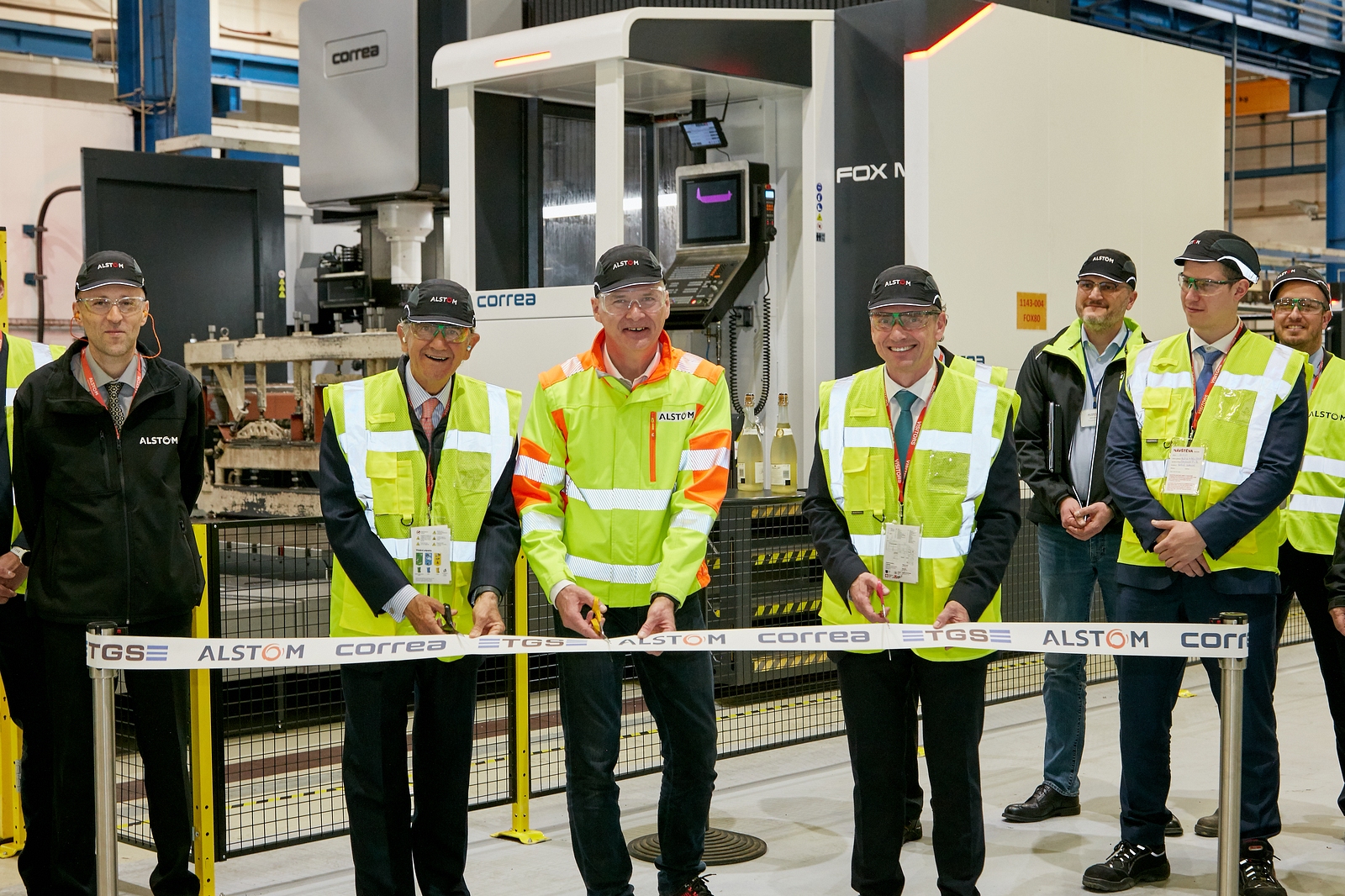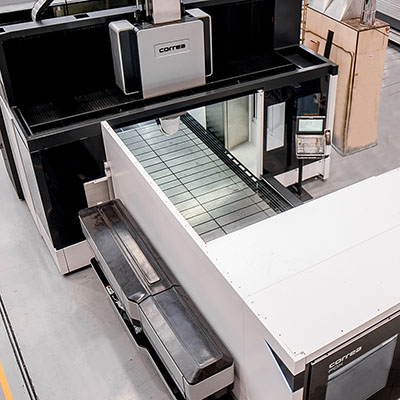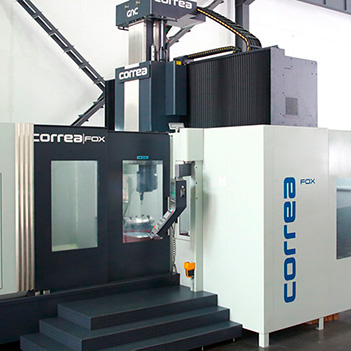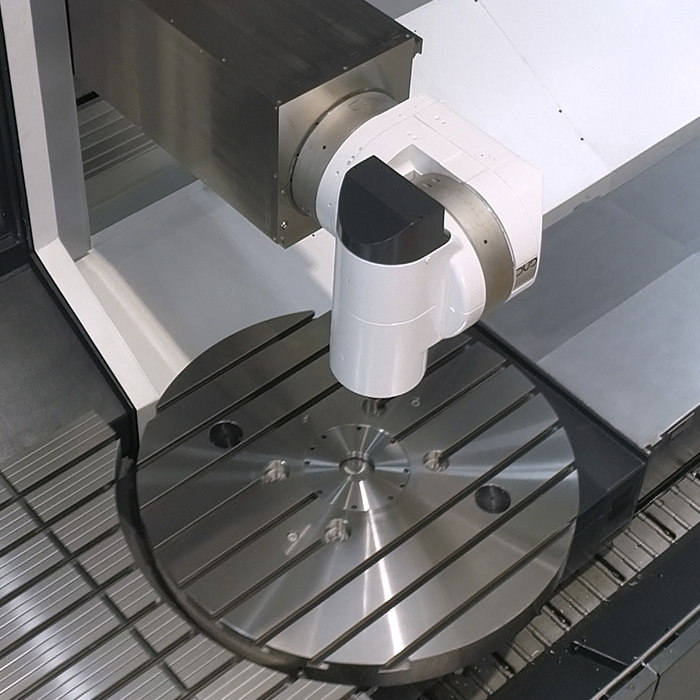Alstom buys three Correa milling machines for its plant in the Czech Republic. The multi-million project aims to increase the efficiency of machining of bogies for the railway sector. The new Correa machines have drastically optimised manufacturing processes, reducing the times by as much as 20%

The French multinational Alstom has purchased three Correa gantry milling machines for its Česká Lípa plant in the Czech Republic. This plant produces parts for commuter trains, trams, metro and other rail vehicles; with almost 1,300 employees, it is one of the largest employers in the region. The project, worth several million euro, consists of a FOX-40 fixed bridge-type milling machine and two FOX M-80 gantry milling machines, co-produced with TGS, the Correa dealer in the Czech Republic. The FOX-40 machine has a travel range of X 4,000 mm, Y 3,000 mm, Z 1,000 mm and an automatic universal UAD head. The two FOX M-80 gantry machines are equipped with three spindles each and have a travel of 8,000 mm on the X-axis, 4,250 mm on the Y-axis and 1,500 mm on the Z-axis. The manufacturing process of the parts was a critical aspect. This challenge to optimise the process was amply met with the new Correa machines, reducing processing times by around 20% of the parts machined by Alstom. The event held to mark the commissioning of the three machines on 26 April was attended by Mr José Nicolás Correa, Chairman of the Correa Group, and Mr José Manuel Revuelta, Economic and Trade Secretary of the Spanish Embassy in Prague.
Close cooperation with TGS
The Czech company TGS is Alstom´s local supplier. As such, communication between the two companies is constant, and the supplier is always up to date with the needs of Alstom´s machining workshop, both in terms of cutting tools and technical support. This project required a thorough understanding of the machining process of the parts to be able to optimise it and create a solution completely adapted to the customer´s application. TGS held numerous meetings with Alstom´s machining department to carry out a time study and a process design that improved the machining times of the production means in operation at the time. "We addressed the design and technological solution of the process so that the behaviour of the machines, the programmes and all service processes are safe and do not require manual interventions by technicians. Production continuity is very important for downstream processes and logistics of a product as large as the train chassis," said Pavel Diviš, the director of TGS. In his opinion, Spanish machines are among the best on the market and TGS is the exclusive representative of this manufacturer in the Czech Republic.
Robust heads
The Alstom Česká Lípa plant makes bogies: mechanically welded, large and complex shaped parts with protrusions and projections, adding to the complexity of the machining process. This type of workpiece is very prone to vibration during machining operations. These vibrations cause faster wear on the heads, among other inconveniences, and Alstom had to frequently carry out repairs on the heads of machines from other manufacturers. These machine downtimes were a critical factor for Alstom with a 24/7 production schedule. For this type of operation, the Correa spindle technology is well suited as the spindle is very rigid, stable and 100% mechanical, with no delicate elements fitted that can be easily damaged during demanding machining operations. Among other things, the main spindle is supported by 6 bearings to provide good performance in this type of application. For this project, a head has been manufactured specifically for the customer´s application. The standard angled Correa head was ISO 50 and did not allow access to some parts of the workpiece. However, commercially available angled heads were not an acceptable solution either, either because they lacked rigidity or because their dimensions did not allow machining in hard-to-reach areas. Correa´s solution was an ISO 40 angled head directly attached to the ram for increased rigidity and compatible with the automatic head change system. Commercial angled heads have also been incorporated into the machine for less demanding one-off operations. Nicolás Correa´s engineering department prepared this solution in such a way that the coupling of these commercial heads is fully automatic (adaptation of the tool change system and design of a "stop-block" or lock for the attachment of this head, which is more appropriate than the standard commercial elements).
Custom solutions
Like all Correa machines, these machines have been adapted to the customer´s workshop and the job requirements; to ensure high machine availability, a spare head to avoid machine downtime and special operating conditions with short response times have been included. "Alstom needed the machines within a short delivery time and the deadlines that were agreed were very tight. Despite the difficulties of recent months, such as the crisis in raw materials, much longer delivery times for commercial elements, price increases, etc., Correa managed to manufacture and install the machines while respecting these delivery deadlines." explains Raúl de la Peña, Area Manager of Nicolás Correa in the Czech Republic. The specifications for Alstom included drawings of several parts for the preparation of time studies, for which they had to guarantee an improvement of around 20% of the production times of each part. Until then, the bogies at Česká Lípa had been machined on several machines. One of the requirements of the new project was to use a single machine, significantly improving downtime between machines and automating the process as much as possible by minimising the labour required. TGS has a FOX milling machine at its facilities and Alstom´s own engineers, together with TGS engineers, carried out tests on this machine, perfecting the CAM projects, checking operation by operation and detecting possible improvements. Finally, it should be noted that in order to optimise the machining process of the parts, special tooling was designed and manufactured by TGS in its facilities.












